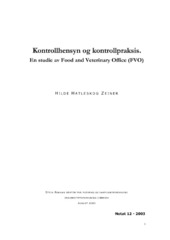| dc.contributor.author | Zeiner, Hilde Hatleskog | eng |
| dc.date.accessioned | 2006-06-21T15:20:57Z | |
| dc.date.accessioned | 2020-12-10T06:31:21Z | |
| dc.date.available | 2006-06-21T15:20:57Z | |
| dc.date.available | 2020-12-10T06:31:21Z | |
| dc.date.issued | 2003-08 | eng |
| dc.identifier.issn | 1503-0946 | |
| dc.identifier.uri | https://hdl.handle.net/1956/1395 | |
| dc.description.abstract | The establishment of the Internal Market in 1992 marked the starting point of a political and theoretical debate concerning the implementation and application of European law, a debate that has been labelled the «new challenge of compliance». Due to a succession of food scares in the 1990s, the challenge of compliance has increasingly been associated with European food regulation, and the establishment of an effective European food control has been identified as a Commission priority. On this basis, the Commission launched a new approach to food control in the European Union founded on the principle that responsibility for food control rests with Member States, while the Commission monitors the manner in which they undertake these responsibilities. In performing its monitoring duties, the Commission acts through the Food and Veterinary Office (FVO). Through an analysis of a selection of the inspection reports of the FVO, this study seeks to clarify the considerations underlying the control practices of the FVO, how the control is organised, how it is carried out and what methods it is based on. The main findings are, for one thing, that the FVO, in accordance with the new approach to food control, emphasises health protection and security. Furthermore, the inspection reports indicate that the FVO has a technocratic approach to control, and thus produces information that informs the political processes, but is not in itself a political actor. | en_US |
| dc.description.abstract | Etableringen av det indre markedet i 1992 innledet en politisk og teoretisk debatt om implementering og håndhevelse av det europeiske regelverket, en debatt som har fått merkelappen «the new challenge of compliance». En rekke næringsmiddelkriser medførte at implementeringsproblematikken ble satt i sammenheng med den europeiske næringsmiddelreguleringen, og etableringen av en effektiv næringsmiddelkontroll ble identifisert som et prioritert område. På denne bakgrunn lanserte Kommisjonen en ny tilnærming til kontroll basert på prinsippet om at kontrollansvaret skal ligge hos medlemsstatene, mens Kommisjonen skal føre tilsyn med de nasjonale kontrollsystemene. Denne tilsynsfunksjonen utføres av the Food and Veterinary Office (FVO). Gjennom en studie av et utvalg av FVOs inspeksjonsrapporter diskuteres hvilke hensyn FVOs kontrollvirksomhet bygger på, hvordan kontrollen er organisert, hvordan den gjennomføres og hvilke metoder som benyttes. Hovedfunnene er for det første at FVO, i tråd med de signaler som fremkommer i Kommisjonens policydokumenter, vektlegger hensynet til helse og sikkerhet fremfor konkurransehensyn. Videre tyder inspeksjonsrapportene på at FVO har en teknokratisk tilnærming til kontroll, og dermed spiller en rolle som informasjonsprodusent, ikke som politisk aktør. | no |
| dc.format.extent | 531467 bytes | eng |
| dc.format.mimetype | application/pdf | eng |
| dc.language.iso | nob | eng |
| dc.publisher | Stein Rokkan Centre for Social Studies | eng |
| dc.relation.ispartofseries | 12-2003 | |
| dc.relation.ispartofseries | Notat | no |
| dc.title | Kontrollhensyn og kontrollpraksis. En studie av Food and Veterinary Office (FVO) | nob |
| dc.type | Working paper | eng |
| dc.subject.nsi | VDP::Samfunnsvitenskap: 200 | nob |
